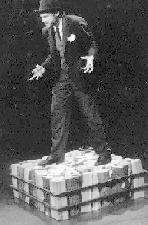SITE GUIDE
SEARCH
REVIEWS
REVIEW ARCHIVES
ADVERTISING AT CURTAINUP
FEATURES
NEWS
Etcetera and
Short Term Listings
LISTINGS
Broadway
Off-Broadway
NYC Restaurants
BOOKS and CDs
OTHER PLACES
Berkshires
London
California
New Jersey
DC
Philadelphia
Elsewhere
QUOTES
TKTS
PLAYWRIGHTS' ALBUMS
LETTERS TO EDITOR
FILM
LINKS
MISCELLANEOUS
Free Updates
Masthead
Writing for Us
A CurtainUp Review
By Elyse Sommer
ç and then you go on. An Anthology of the Works of Samuel Beckett
|
I f I could begin all over again, knowing what I know now, the results would always be the same.
. . . I'm afraid to go on because to go on is to find me. . . to go on is to lose me and begin again |

Bob Jaffe
|
For . . . and then you go on, which opens the Berkshire Theatre Festival's 2001 season at its smaller Unicorn Theater, Bob Jaffe has, like Bill Irwin, adapted Beckett material for a tour de force solo performance piece. Like Irwin, Jaffe succeeded in negotiating approval from the Beckett estate and Les Gutman's image of "Beckett looking down on the result from whatever existential firmament he now inhabits, grinning broadly" applies to this slightly longer performance piece. Its title and Beckettian spirit of coexisting optimism and despair come from the final words of an early novel, The Unnameable, one of the dozen sources for Jaffe's anthology: "I can't go on, I'll go on."
Mr. Jaffe, whose career encompasses directing and stage management as well as acting, is not quite as natural a clown as Bill Irwin and his piece, while more wide ranging in its sources, is not as remarkably physical as Texts for Nothing. That said, his performance is potent enough to make for an absorbing eighty minutes that requires no prior knowledge of the anthologized works to comprehend Beckett's link to such classic comedians as Charlie Chaplin and Buster Keaton. The tramp-like bowler hat, the bits of business, the shifting facial expressions are all there. So are the underlying screams of despair -- like the screams of a dying cancer patient that Beckett once described to Harold Pinter as "the only kind of form my work takes."
Since Beckett's work is unified by an overriding schematic of seesawing between petty routines and the grander concerns for going on, the author's fans will see links even to plays not included in the anthology. Thus Jaffe's tramp-like narrator will bring to mind not just Gogo and Didi from Waiting For Godot, but also Winnie, who spends all of Happy Days (not listed in the source list) embedded in a mound of earth yet goes through all sorts of little routines to get her through the day. Jaffe's "going on" goings on include silent bits (e.g. folding up his sock to clean the spaces between his toes and a handkerchief to clean his navel) as well as jokes about wrapping his beggar's self in newspapers on which "even farts make no impression" (a detailed summing up of his scatological excesses lead him to drolly observe "extraordinary how mathematics help you to know yourself").
Jeremy Woodward's simple scenic design -- a rectangular assemblage of logs in the center of a circular platform, and an upstage walkway with a single seat, nicely captures the blend of darkness and comedy (most effectively supported by Holly Ratafia's lighting). There's no apparent reason for those logs, except as a place for Jaffe to sit, to stand, to put his belongings. Yet, those logs struck me as a subtle metaphor for lives, which could any minute go up in flames as civilization becomes uninhabitable and the narrator unable or unwilling to go on.
This funny and haunting opening salvo for the Berkshire Theatre Festival 2001 season is not your easy to watch (and forget) summer stock fare -- but if you pay attention, you'll be amused as well as saddened. If you find yourself occasionally confused and ready to give it up, bear in mind that after the narrator advises "Give Up " he declares: "I shall go on as I've always done, not knowing what I do or who I am or where I am -- or if I am."
Consumer note: All seats in the BTF's comfortable smaller theater, the Unicorn, have excellent sight lines.
OTHER BECKETT PLAYS REVIEWED AT CurtainUp
Texts for Nothing
Happy Days
Eh Joe
Krapp's Last Tape
Waiting For Godot
Complete Lost Works of Samuel Beckett
|
. . . AND THEN YOU GO ON -- An Anthology of the Works of Samuel Beckett
Adapted and performed by Bob Jaffe from a dozen Beckett texts Directed by Peter Wallace Set Design: Jeremy Woodward Costume Design: Marilyn Salvatore Lighting Design: Holly Rataga Running Time: 80 minutes with one 60 second intermission Berkshire Theatre Festival, Stockbridge, MA, 413/298-5536, web site 5/25/01-6/09/01; opening 5/25 -- Evening performances, 8:30 pm; 5/27 and 6/03 matinee, 3 pm -- $20 general admission Reviewed by Elyse Sommer based on May 25th performance |


